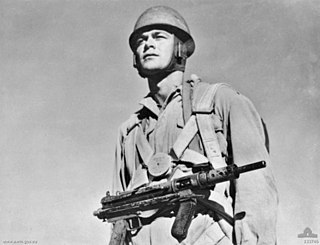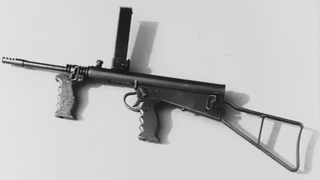 W
WThe Austen was a 9×19mm Australian submachine gun derived from the British Sten gun developed during the Second World War. In total 19,914 Austens were produced during the war by Diecasters Ltd of Melbourne and W. T. Carmichael Ltd of Sydney.
 W
WThe Enfield Revolver was a self-extracting British handgun designed and manufactured at the government-owned Royal Small Arms Factory in Enfield, initially in the .476 calibre.
 W
WThe Flamethrower, Portable, No 2, also known as the Ack Pack, was a British design of flamethrower for infantry use in the Second World War.
 W
W"Mills bomb" is the popular name for a series of British hand grenades. They were the first modern fragmentation grenades used by the British Army and saw widespread use in the First and Second World Wars.
 W
WThe Owen gun, which was known officially as the Owen machine carbine, was an Australian submachine gun designed by Evelyn Owen in 1939. The Owen was the only entirely Australian-designed and constructed service submachine gun of World War II and was used by the Australian Army from 1943 until the mid-1960s.
 W
WThe Stokes mortar was a British trench mortar designed by Sir Wilfred Stokes KBE that was issued to the British and U.S. armies, as well as the Portuguese Expeditionary Corps, during the latter half of the First World War. The 3-inch trench mortar is a smooth-bore, muzzle-loading weapon for high angles of fire. Although it is called a 3-inch mortar, its bore is actually 3.2 inches or 81 mm.
 W
WThe Thompson submachine gun is a blowback-operated, air-cooled, magazine-fed selective-fire submachine gun, invented by the United States Army Brigadier general John T. Thompson in 1918. It was originally designed to break the stalemate of trench warfare of World War I, but was not finished until after the war ended.
 W
WThe Webley Revolver was, in various marks, a standard issue service revolver for the armed forces of the United Kingdom, the British Empire and the Commonwealth, from 1887 until 1970.